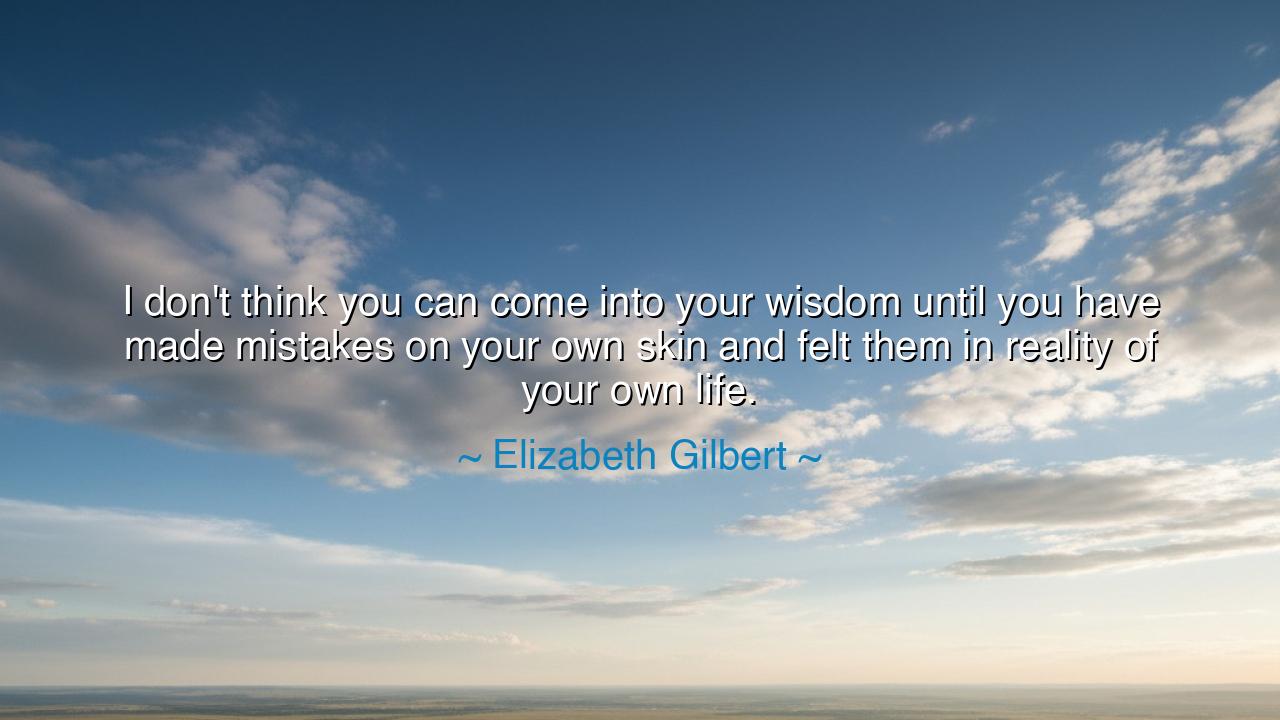
I don't think you can come into your wisdom until you have made
I don't think you can come into your wisdom until you have made mistakes on your own skin and felt them in reality of your own life.






The words of Elizabeth Gilbert shine with the raw fire of experience: “I don’t think you can come into your wisdom until you have made mistakes on your own skin and felt them in the reality of your own life.” In this truth, she declares that wisdom cannot be inherited like coin, nor taught like arithmetic. It must be carved into the flesh of the soul by the blows of error, pain, and redemption. Only when one has stumbled, bled, and risen again does the light of true wisdom dawn.
For the mistakes of others can warn us, but they cannot shape us. A child may be told the fire burns, but until his own skin feels the heat, the lesson remains half-real. So it is with life: the counsels of elders, the books of philosophers, the stories of saints—all are precious, yet none can replace the hammer and anvil of personal trial. Gilbert’s words remind us that wisdom is not secondhand—it is won, and it costs the one who seeks it.
History gives us luminous witnesses. Consider Augustine of Hippo, who wandered through passions and false philosophies before he found the truth of faith. His mistakes, lived and suffered in the marrow of his life, became the very soil from which his writings on grace and love grew, writings that continue to guide souls for centuries. Without his errors, his wisdom would have been thinner, less rooted in the reality of human struggle.
Even great leaders have known this truth. Abraham Lincoln’s early years in politics were marked by defeats and humiliations, yet each failure deepened his resilience and sharpened his vision. By the time he bore the weight of a nation torn by civil war, his wisdom was no mere theory—it was lived, tested, and purchased through his own scars. The man who had once failed repeatedly could now endure what might have crushed a weaker spirit.
Therefore, let this teaching endure: embrace your mistakes, for they are not only wounds but teachers. Do not flee from the reality of your own errors, for in them lies the refining fire of wisdom. As Gilbert declares, only by carrying our own burdens, by feeling the pain of our choices upon our own skin, can we grow into the strength and clarity that life demands. Thus the path of error, though bitter, becomes the very road to greatness.






NVTuan Khoa Nguyen Vo
This statement strikes me as both liberating and sobering. It implies that mistakes aren’t detours but essential milestones. Yet I can’t help but ask—why do we resist them so much if they’re so valuable? Maybe we’re conditioned to equate error with weakness, when in truth, it’s the foundation of wisdom. I’d love to know how Gilbert herself transformed personal failures into insights worth sharing.
JJenny
There’s a comforting realism in this idea. It suggests that wisdom can’t be rushed or borrowed—it has to be earned through lived experience. But it also makes me wonder, is there a limit to how much we should learn ‘the hard way’? Sometimes we romanticize struggle, forgetting that not all pain leads to growth. How do we balance learning through mistakes without glorifying suffering?
NYTran Ngoc Yen
I love how honest this perspective is. It feels like a gentle reminder that mistakes aren’t failures but necessary steps toward maturity. Still, it makes me think—do all mistakes lead to wisdom, or only the ones we’re willing to reflect on? Some people seem to repeat the same errors without learning. So maybe it’s not the pain itself, but how we process it, that turns experience into understanding.
TQTrang Quynh
This quote really resonates with me because it reminds me that wisdom isn’t something you can learn secondhand. Books and advice can guide us, but personal pain seems to be the real teacher. I wonder though—why does growth always seem to require struggle? Is it just human nature to need consequences before understanding? Maybe true insight only comes when the lessons cost us something personally meaningful.